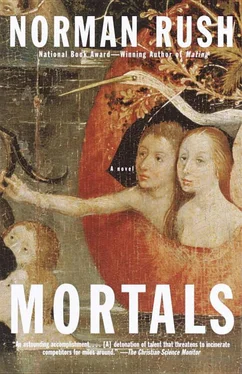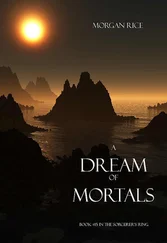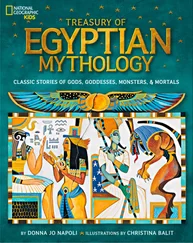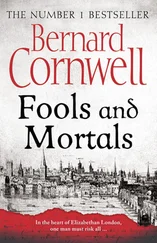“He just … ate the crucifix, with a staring expression on his face.
“It looked demonic, of course. Eating it insanely, with chunks and crumbs falling out of his mouth. I suppose people just thought Rex was a crazy person, but there was an electric pall cast over everyone. My father was stunned. There was terrible misery over it when we got home but Rex said he’d only done it because he thought everybody would think it was funny. He was full of apologies. Another one of his talents was that he could weep on cue.
“So he got exactly the outcome he wanted. My father was too ashamed to ever go back there. He knew that whatever he did he was going to be the father of the kid who ate the crucifix. Brilliant.”
They sat in silence.
Iris asked, “Isn’t it funny that I never met your brother? What does he look like? Like you?”
“Ask him for a snapshot. But no. He’s bald, must be by now. Shorter than I am. He has a very small mouth. He had a trick he could do when he wanted to show that he was hearing something that was incredibly stupid. One of his subtle things. He could flatten his nose, sort of, and flare his nostrils out and make his upper lip puff out, shelve out. He knew it cracked me up. Also … well, he looked sort of feminine. His skin was very pale. These areas under his eyes got bluish when he was tired or sick. He resembled my mother’s side of the family. Big extremities, big feet, big limp hands that look like paddles when they’re lying in his lap. He had hips.”
“So you’re physical opposites.”
“One other thing, because I think maybe it had some occult effect on the way he turned out. He had rather prominent, almost Dracula eye-teeth. I’ve wondered if maybe he was swimming in a sea of negative associations that people have for prominent incisors, thanks to the movies, and maybe he adapted to that. I don’t know. It’s a theory. He got them ground down before he went off to college. It should have been done sooner. It was never discussed. He was an awkward person. He looked awkward.”
“So, pretty much, you’re physical opposites.”
I hope so, Ray thought. He felt that he didn’t really know how he looked, though, or how he ranked rather. There was no question about his weight. He was lean. Iris kept telling him that he was handsome, that he was beautiful. But he was forty-eight. You have such great legs, give me your legs and take mine, she would still say. She thought her thighs were too soft. He couldn’t convince her she was judging herself by some unreal standard. They had been married for seventeen years and statements made in the context of marriage about how the other looks were statements of a certain kind, except that in his case he was telling her the absolute truth. When he’d had to start wearing glasses she’d said he reminded her of the distinguished types they choose for display portraits in opticians’ windows that show how glasses make no difference in the attractiveness of the truly handsome. You look like what you are, you look like a scholar, she’d said. He was used to the bush shorts and shortsleeved shirts and kneesocks he had to wear in Africa, but he didn’t love wearing them. His arms were average. His legs were a far cry from the mighty instruments you could see walking up and down the mall. It had been a while since she’d said Your hair must be German because it’s thick, blond, and obedient. Now he was going gray. No, what she had actually said was You look like what you are, a scholar and a fine person. Then she had tacked on that he was beautiful.
She said, “We can postpone talking about the main event until another time. I appreciate you, Ray. You’re being very open. This has been your secret, really. I love you. I know you don’t enjoy talking about these things. About Rex. I do appreciate you.
“I wish you could love your brother.”
She had brought things to a close.
She pulled the lap of her skirt free and smoothed it out across her thighs. She began slowly inching the hem up, looking steadily at him.
“You seem to be a whore tonight,” he said.
“Always,” she said.
4. Thank God This Isn’t the Only Thing I Do
Sometimes Ray started his patter for the occasional groups of overseas educators who visited St. James by saying Welcome to the only completely circular campus in the known world. It was true, so far as he knew, but he had noticed that lately the rector was showing a clear preference for not having the school described primarily in terms of the ways in which it was very unlike what the visitors were used to. And there were so many ways in which it was very unlike. But it truly was interesting that when the All Saints Trust had gotten permission to build whatever it liked in the broad, rock-ridden depression in the raw bush west of the capital, somebody had chosen to lay out the grounds in the shape of the ancient Greek world-serpent eating its tail, which happened to be his own private metaphor for the educational process when he was feeling down. But there was no one still around from the founding days in the sixties who could say why it had been done. His guess was that it had been an attempt to cohere symbolically with the universal preference for the circular in Tswana culture, as in the kraals and huts. He liked to point out the circularity of St. James because it was interesting, but the place was so extensive that its circularity was only noticeable from the air. The circle had been filled in solidly with distracting features — nethouses, rondavels, ovaldavels, completely rectilinear ablution blocks, sports fields, a chapel in the form of a rondavel with a bell tower stuck onto it, fig tree groves, the piggery … The most southerly baobab in Africa grew on the grounds.
The four people in the group waiting for him to begin were obviously impressed with his office. He had his own oversized rondavel entirely to himself. They liked the zebra skin on the wall behind him and the jennet kaross covering a good deal of the floor. His desk chair was thronelike. This group was from Cyprus, two men and two women. They were very courteous. They spoke English, but hesitatingly. He had a circulating fan grinding out a breeze for them. It was trained directly at them and they were grateful. They had glanced uneasily up at a white spider pod the size of a doorknob clinging to the thatch directly above one of them. They probably liked, without knowing why, the pleasant dissonance between the associations they had for the primal versus the refined aspects of his office — the primal thatch smelling subtly like bread and the primal skins and the spider pod versus the refined glass-fronted bookcases and the orderly array of books and periodicals they displayed. When they were gone he would knock the spider’s nest down. The sad, comradely feeling he had for this group was real.
He began, “St. James College isn’t a college … nor is Moeding College in Otse a college, nor is the other one … Moeng College, in Moeng, of course. A college.” He heard himself sounding more British than usual. He’d just almost said And nor is. Sounding British happened to him at work if he didn’t watch himself. Four senior staff members and the rector were Brits.
“We’re a senior secondary school,” he said, and went on to explain that they might be considered a somewhat elite school because not all secondaries awarded the Cambridge certificate as they did. Beginning by saying St. James wasn’t a college always led to the temptation to tell about the Peace Corps volunteer teacher who’d taught for them for a year and then left after undergoing a breakdown and who in his terminal interview had said It looks like a bank but it isn’t a bank, It looks like a post office but it isn’t a post office, It looks like a restaurant but it isn’t a restaurant. That had been his explication of why he had never adjusted to Botswana. The discrepancy between what he thought institutions were supposed to be and what they were in Africa had been too much for him, among other things about the country. There were aspects of St. James that would fit into a litany about things not being what they seem. St. James was denominational but the All Saints Trust that sponsored it wasn’t a denomination. It was a peculiar institution. There were authentic religious involved in it, but a lot of the lay element in All Saints seemed to be ex — British military. The emissaries from the trust who came out to inspect every year all were. The trust was famously generous with bursaries in their schools in southern Africa, although he was picking up tremors and rumors that budget cuts were coming. Cuts would hurt. He would be all right. His position at St. James was good for as long as he wanted it. That had been arranged at a level far above the rector.
Читать дальше












